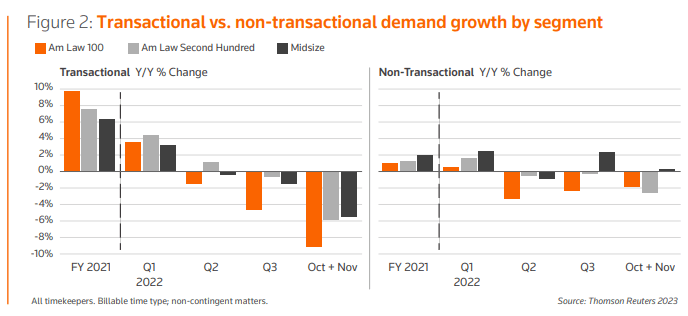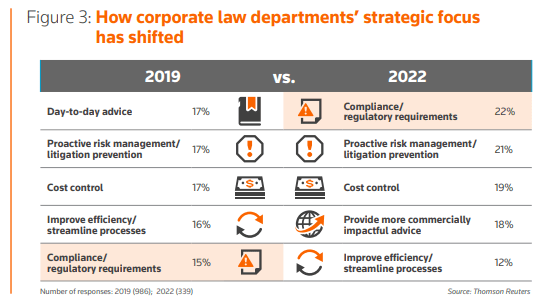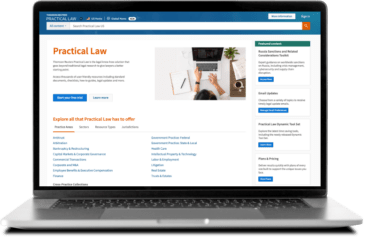Utilizing best-in-class content, supported by generative AI to move you from questions to work product, faster.
Transactional attorneys faced tough headwinds in 2022 and 2023, as demand for their services dipped and in-house legal teams doubled down on spend management.
It turns out that, with the right technology and tools in place, this softer demand can lead to opportunity. That’s especially true for transactional attorneys to evolve alongside their clients and grow despite changing demands. In the long run, that evolution will lead to one of the greatest benefits of modern technology: happier clients.
The shifting needs of in-house legal teams change the demand equation for law firms
Demand for transactional services from law firms flipped upside down from the end of 2021 to the end of 2022. What had been nearly double-digit growth turned into nearly double-digit decline, according to the 2023 State of the Legal Market report from Thomson Reuters.

That left a lot of transactional practice areas all staffed up with nowhere to go.
Clients experienced this shift in their own way. Many in-house legal teams had been working intensely to support growth and transformation within their companies. These legal teams also received directions to manage outside legal costs and see about keeping certain types of work in-house. According to the 2023 State of the Corporate Law Department report from Thomson Reuters, cost control is the third most important strategic focus for corporate legal departments worldwide and the top priority for those in the United States.

That dynamic can call into question the foundation of the relationship between clients and their outside counsel. Law firm attorneys have developed an expertise that makes them the go-to for certain matters. And in-house legal teams are examining matters that come up so routinely that they can handle them themselves.
Tools to help lawyers evolve with their clients
Modern technology makes it easier for lawyers to confidently say yes to types of matters they haven’t worked on before. Take Practical Law, for instance. This know-how tool serves up the information and template you need to get started in a new area of law.
And, with Search & Summarize Practical Law, you can use the power of generative AI combined with the trusted expertise of Practical Law content to find answers faster.
What is Search & Summarize Practical Law?
Search & Summarize Practical Law is a generative AI search tool that allows users to enter a natural language question into an intuitive chat experience to get a summarized answer from expertly written and maintained Practical Law resources.
Our generative AI technology is built specifically for the legal industry and our solutions. Harnessing its power can dramatically improve the way you access the trusted expertise from Practical Law. It provides trusted, synthesized answers while connecting you to supporting Practical Law resources for deeper insights.
 | Introducing Search & Summarize Practical Law AI: Generative AI meets legal how-to |
Other features within Practical Law Dynamic Toolset with CoCounsel
Knowledge Map
Visually navigate Practical Law’s collection to get a complete picture of your matter and identify issues you may have missed.
Interactive Matter Maps
With Matter Maps you can plan your work on each matter. You see the core phases and tasks in a legal matter with links to key resources at each phase.
Quick Compare
Identify local laws faster using Quick Compare. With just a few clicks, create charts that answer key questions across states so you can explore the topics and data points that matter most to you.
What’s Market Analytics
Create data-driven insights and visualizations with What’s Market Analytics. Use it to analyze and share market trends and deal terms quickly. The visualizations from What’s Market Analytics help you make recommendations even faster and communicate your approach persuasively to clients and colleagues.
Build your expertise to better serve your clients
Your in-house clients are always going to go through cycles of taking more work on in-house. That doesn’t have to mean they will need you less. As certain types of matters become routine for them and they staff up to keep things in-house, you can shift your efforts to matters they aren’t encountering regularly.
As a trusted expert, clients rely on you to handle the legal scenarios they don’t see every day. You have the resources and the deep bench of problem-solving associates to deliver excellent work even on matters you haven’t seen before.
If you feel confident about the tools you have backing you up, you can also feel confident about your ability to take on new matter types. Your ability to say “yes” to new and non-routine matter types lets you meet your client’s needs as they change, so they don’t have to find a different firm to take the matter. No more “no’s” from you leads to happier clients and a happier, busier transactional law team.
Practical Law Dynamic Tool Set with CoCounsel
Deeper insights, faster answers. Unlock the power of Practical Law.
Learn more about Practical Law’s latest feature, Search & Summarize Practical Law.













